I’m a South African who immigrated to the US in the mid-1990s. On a recent two-year stint back home, one fact struck me like a summer highveld hailstone. After a quarter of a century abroad, I still knew more about my home country than my adoptive one – about trees, birds, place names, and above all, history: Mapungubwe, Great Zimbabwe and King Shaka; Van Riebeek, Kruger and Tambo.
So when I got back to the rolling green hills of Pennsylvania, I made a point of picking up a pile of history books from the library of the university where I teach. But then a strange thing happened.
“Have you heard of Chaco Canyon?” I asked my American husband, over pancakes and maple syrup.
“You know, North America’s Machu Picchu?” Meaning a vast stone city near Albuquerque, which around 1200 AD formed the hub of a trading network from Costa Rica to California.
He shook his head.
OK, then – how about Lord Amherst, who ordered blankets from a smallpox ward to be handed out by spies to Native soldiers?
“Wait, there was a specific guy who did that?” an American friend replied.
Well, then, Metacom? Alienated by 50 years of English disrespect, this Pokanoket sachem, or chief, united most of the Native nations of New England into a coalition which almost kicked the English out in the 1670s.
If he’d won, I’d be teaching my literature classes in Susquehannock.
“Meta who?”
Call it a follow-up, then, to my US naturalisation test.
A trip to the beginning: the spot where Metacom’s father, Ousamequin, welcomed the Pilgrims to North America in 1620; where Metacom planned his later rebellion, and where a Christian convert and Pokanoket turncoat named John Alderman eventually shot Metacom in the heart.
Metacom’s seat is located near Providence, Rhode Island, on land owned by Brown University. In the wake of major protests by Pokanoket activists in 2017, the university now administers the site in consultation with indigenous nations.
So on a grey, chilly afternoon we drive down Metacom Avenue, past the usual North American commercial sprawl, into Mount Hope Farm, one of those well-groomed agricultural estates long ago moved on from carrots and onions to the more lucrative business of weddings and tourists. (Mount Hope gets its name from Montaup, the Pokanoket name for their administrative capital).
Brown University subcontracts its permit-issuing to Mount Hope Farm. So now, a pleasant, middle-aged woman issues us our free map and ticket.
“But I can’t answer any questions,” she says quickly. “For that, you’ll have to ask the professors at Brown.”
Which is fair enough. For example, to prepare for this trip, I have read up on Brown historian Linford Fisher’s seminal study on Metacom’s war, where he painstakingly traced the deportations of five million Native North Americans into Caribbean slavery to the aftermath of that war – a forgotten holocaust.
But now we are off, back along Metacom Avenue to Tower Avenue, where we turn right, in the direction of Mount Hope Bay, a tidal estuary where, in Ousamequin and Metacom’s time, dugout canoes would have paddled down the coast.
After Ousamequin welcomed the pilgrims here in 1620, the Pokanoket-English alliance steadily unravelled. Hundreds of thousands more settlers arrived.
The English permitted their pigs, cows, and goats to gobble up Native vegetable gardens. When the Pokanoket retaliated by setting their dogs on English livestock, colonial courts imposed so many fines consisting of hectares of land that by the 1670s, Metacom’s people were largely dispossessed.
Throughout 1674 and 1675, also from here, Metacom built his vast anti-colonial alliance. The success of this diplomacy seems, with hindsight, staggering. It included most of the indigenous nations of New England – Wampanoag, Nipmuc, Abenaki, as well as the powerful Narragansett and Mohawks, traditional rivals of Metacom’s people
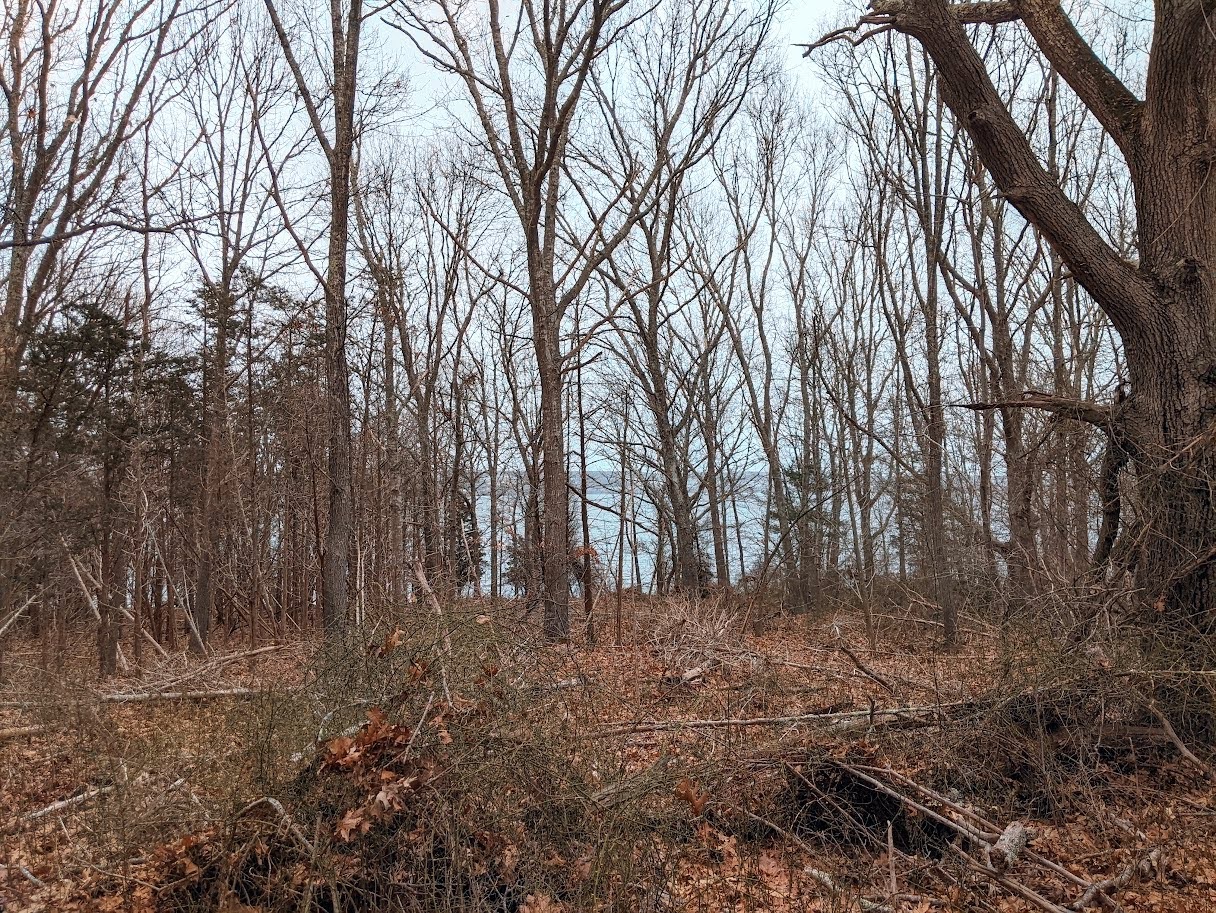 The view from Montaup out to Mount Hope Sound. (Photo: Peterson Toscano)
The view from Montaup out to Mount Hope Sound. (Photo: Peterson Toscano)
Metacom sold more Pokanoket lands to English settlers, to buy guns. His implicit gamble was simple – arm Native people now, and get the land back later, by military force.
In June 1675, the lieutenant governor of Rhode Island, John Easton, sailed here, across the sound, to try to avert a war. Here, Metacom subjected him to a lecture that perhaps no white official had heard before.
“When your people arrived,” Metacom told Easton, “my father was as a great man and the English as a little child.”
Ousamequin, Metacom implied, could have crushed the colony. Instead, he welcomed and nourished it.
But since then, the ungrateful English had thrown the Pokanokets’ kindness back in their faces.
Now, we cross a stream that isn’t named on our map – in Metacom’s time, perhaps it was called something. Then, voila, our ordinary suburban street turns into a wilderness road. All around us, bare spring trees – maples, hickories, walnuts – reach up to a grey sky.
We arrive at what looks like a quintessential New England barn – weathered, white-painted wood; English gambrel roof. The place is empty and boarded up. A sign proclaims, “Historical Site Visit Access Only.”
We are the only vehicle in the lot, except for an abandoned snow plough. Granted, it’s still cold for tourists. But there is not so much as a trailhead marker. Nor is the map particularly clear.
But now we notice an iron gate. This is our best guess, confirmed when the road quickly leads into a grassy swamp, filled with more ghostly pale trees surrounding us like so many silent ancestors.
In 1678, after three years of harrowing, bitter conflict involving massacres and engineered famines, Metacom realised the game was up. Why, sensing defeat, did he return here? Perhaps, like many of us travellers, he longed to die where he grew up.
He died in this marsh.
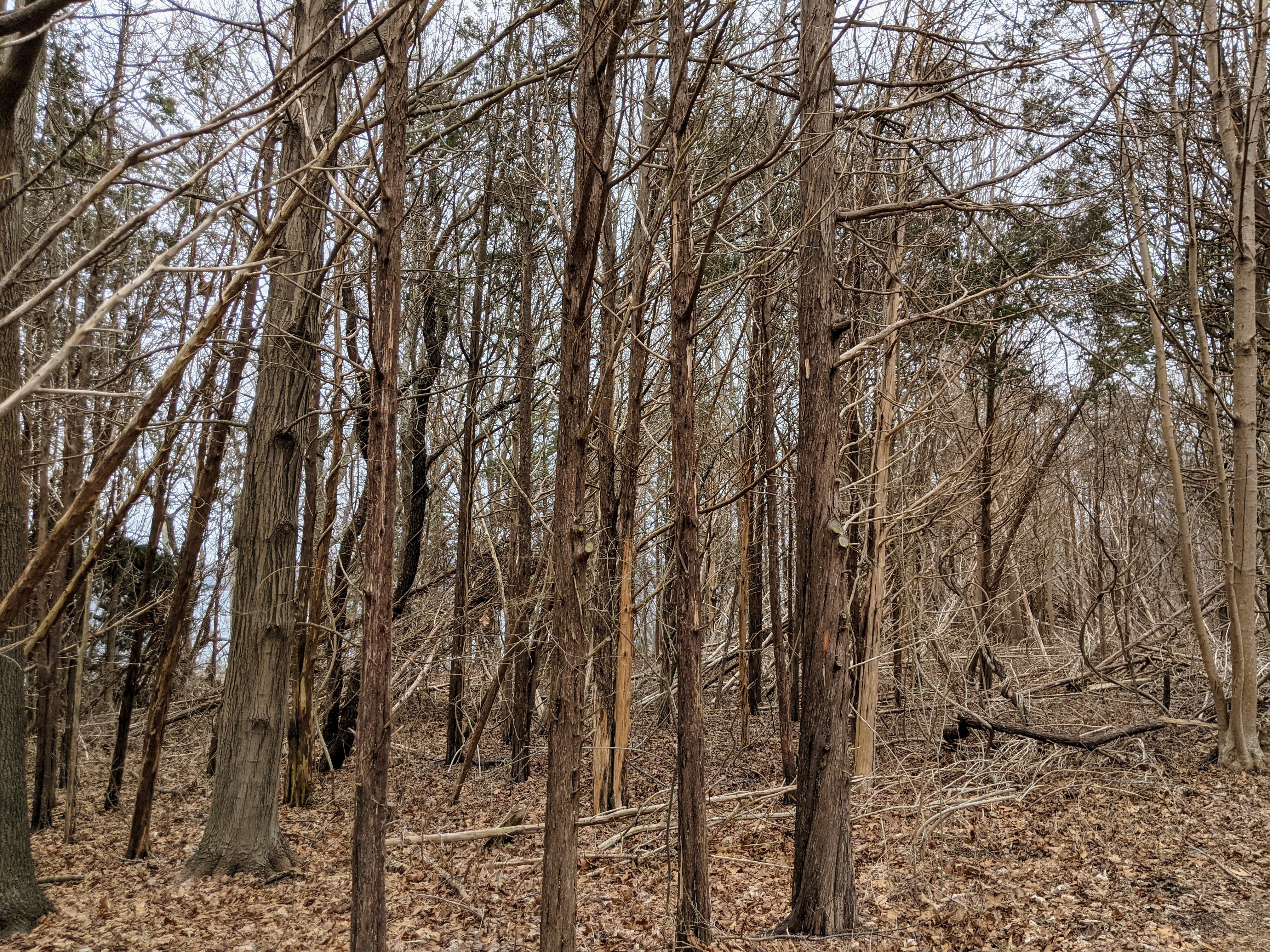 Trees in the swamp where Metacom was shot. The English quartered his body and hung up the pieces in trees like this. (Photo: Peterson Toscano)
Trees in the swamp where Metacom was shot. The English quartered his body and hung up the pieces in trees like this. (Photo: Peterson Toscano)
The English cut his body into quarters and hung them in these trees.
The “praying Indian” who landed the fatal shot got his right hand as a trophy.
Metacom’s head was mounted on a spike in Plymouth Village, and remained there for a quarter century, both a celebration and a warning.
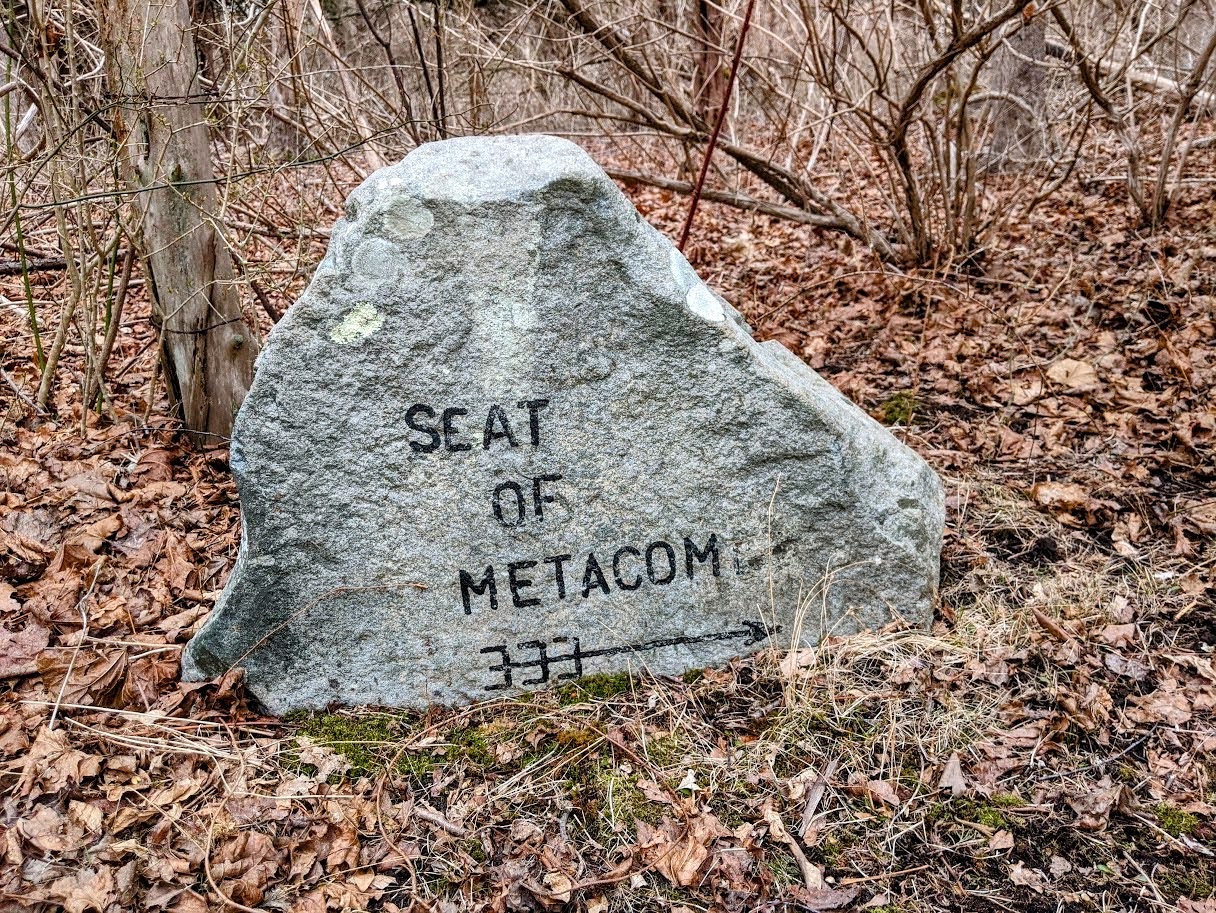 Sign set back from the road, pointing the way to Metacom’s seat, 333 feet away. (Photo: Peterson Toscano)
Sign set back from the road, pointing the way to Metacom’s seat, 333 feet away. (Photo: Peterson Toscano)
We look again at our map – we’ve walked too far. We double back, and at last see a painted arrow. We follow the path it demarcates, turn a corner in the woods, and then here we are, at a bank of rocks with a marked hollow in it, speckled with dried moss, and filled with dead leaves that swirl gently in the mild breeze: Ousamequin and Metacom’s seat.
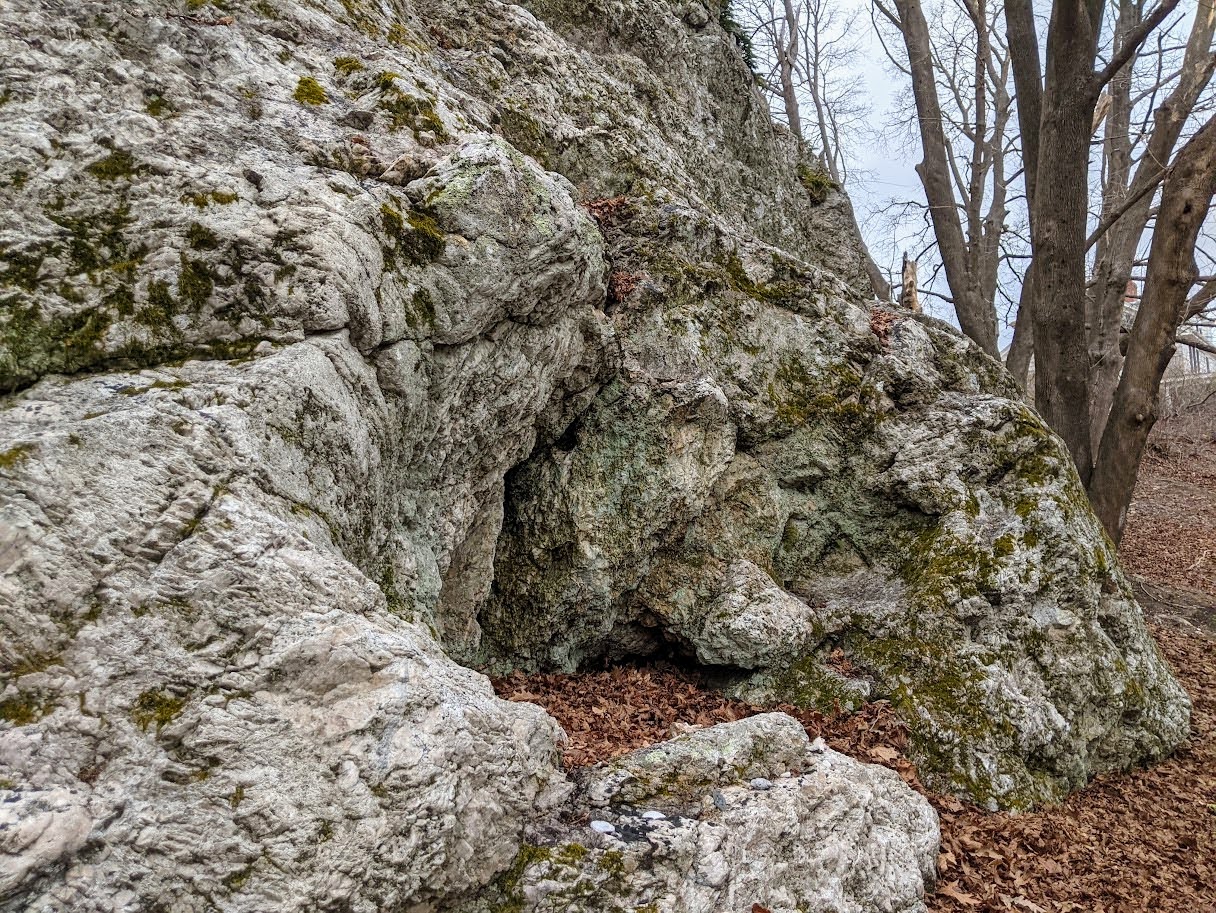 The seat where Ousamequin welcomed the Pilgrims to North America in 1620, and where Metacom organised his rebellion fifty years later. (Photo: Peterson Toscano)
The seat where Ousamequin welcomed the Pilgrims to North America in 1620, and where Metacom organised his rebellion fifty years later. (Photo: Peterson Toscano)
Which was the more consequential? Ousamaquin’s 1620 harvest festival with the newcomers, one inspiration for today’s Thanksgiving? Or Metacom’s belated but potent rebellion, which left the Puritans’ Holy Kingdom in smoking embers?
Either way, no commemorative plaque or board adorns the site itself.
If I had not seen pictures of these rocks ahead of time, I would have thought these ordinary, if picturesque formations.
I’ve seen pictures of a crumbling, heavily eroded stone marker nearby showing the precise spot where Metacom fell. This was laid by the Rhode Island Historical Society more than a hundred years ago. But today we can’t find that marker, and no one has ever thought to lay a new one.
 Shells likely to have been left by contemporary Native Americans as a tribute to their ancestors. For Pokanokets and other modern Native people, Montaup is a sacred site. (Photo: Peterson Toscano)
Shells likely to have been left by contemporary Native Americans as a tribute to their ancestors. For Pokanokets and other modern Native people, Montaup is a sacred site. (Photo: Peterson Toscano)
Alone in these woods at the edge of a continent, my husband and I touch Metacom’s rocks. We spend 10 or 15 minutes, silent, listening to the breeze and the distant water. A blue jay squawks above us. We smell the salt of the bay.
Then we return to our car, and the empty parking lot, and the stream without a name.
As we drive back into the world of hooting lorries and shouting workers and the whoosh of high-pressure car washes, there is plenty of literal noise surrounding us.
But the great American silence about Native lives and losses thrives, unabated, in the afternoon din. DM
Glen Retief’s The Jack Bank: A Memoir of a South African Childhood, won a Lambda Literary Award. He teaches creative nonfiction at Susquehanna University and recently spent a year in South Africa as a Fulbright Scholar.




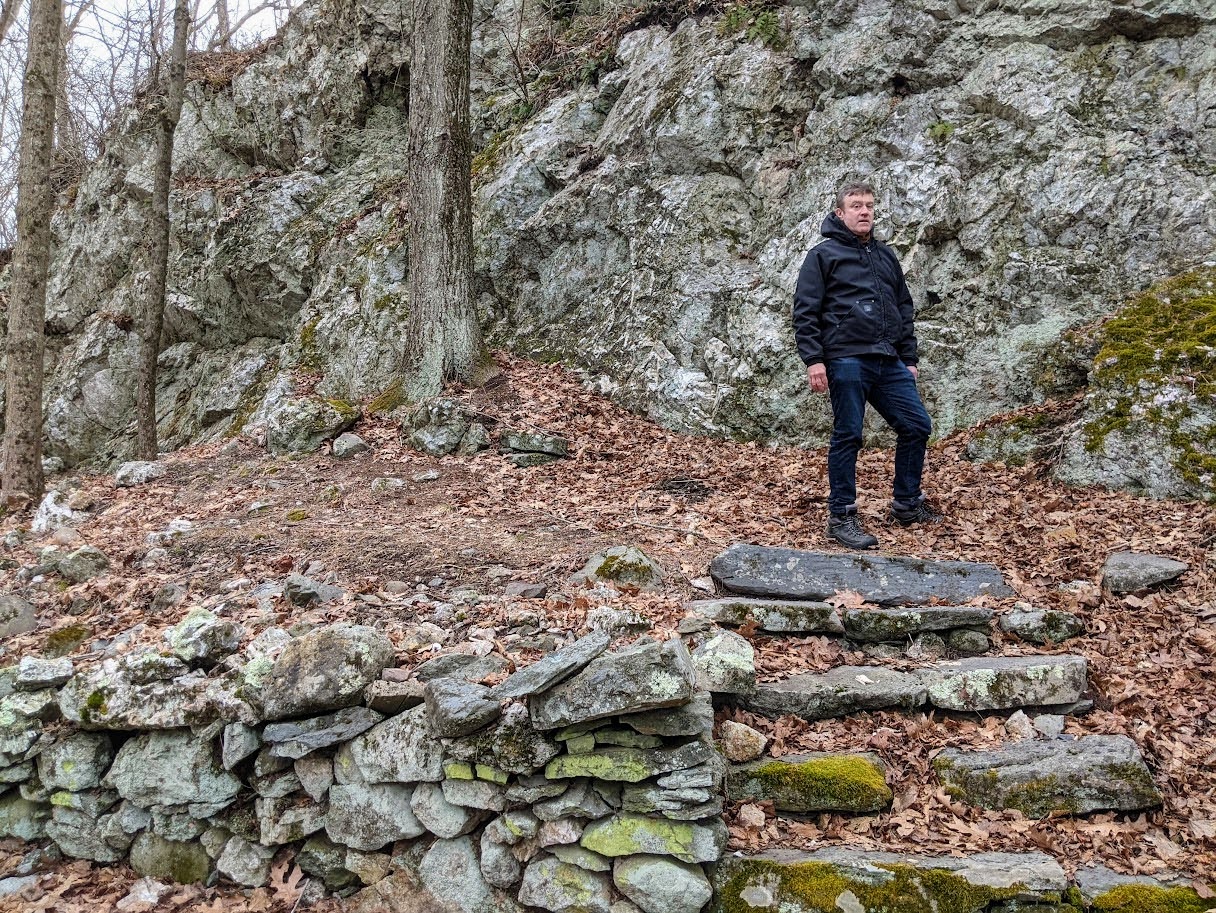 Shells likely left by contemporary Native Americans as a tribute to their ancestors. For Pokanokets and other modern Native people, Montaup is a sacred site. (Photo: Peterson Toscano)
Shells likely left by contemporary Native Americans as a tribute to their ancestors. For Pokanokets and other modern Native people, Montaup is a sacred site. (Photo: Peterson Toscano)